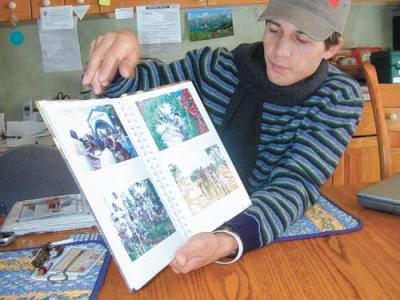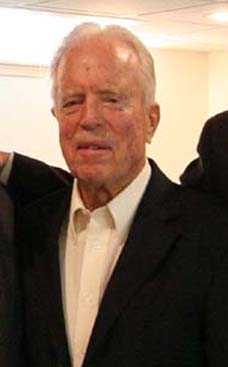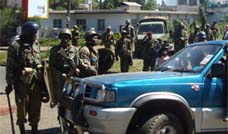
"The hardest part really is getting used to the fast pace we live in," he said Thursday during an interview at his parents' East Street home. "I'm already checking my e-mail a couple times a day. When I was in El Salvador, I'd maybe check it twice a week, when I visited a cyber cafe." He added, "There's also this disconnect between people here. In El Salvador, I really loved the sense of community. Here, I know my neighbors, but I can't say I've been in their homes more than once. In El Salvador, you know everyone more intimately. You go to each neighbor's house for coffee and sweetbread. They're so very open."
After spending 2 1/2 years with the Peace Corps in El Salvador, Nathan Karrel is still readjusting to the cold temperatures and fast-paced life-style of Americans
H.V. grad back from El Salvador
By Jennifer Huberdeau, North Adams Transcript
Article Launched: 01/07/2008 12:16:16 PM EST
Caption: Nathan Karrel, 24, of Adams, thumbs through a photo album of pictures taken during his 2 1/2 year assignment in El Salvador with the Peace Corps. Photo: Jennifer Huberdeau/North Adams Transcript
Monday, January 7
ADAMS — After spending 2 1/2 years with the Peace Corps in El Salvador, Nathan Karrel is still readjusting to the cold temperatures and fast-paced life-style of Americans.
Karrel, 24, a 2001 graduate of Hoosac Valley High School, returned home from his South American deployment on Dec. 18.
"The hardest part really is getting used to the fast pace we live in," he said Thursday during an interview at his parents' East Street home. "I'm already checking my e-mail a couple times a day. When I was in El Salvador, I'd maybe check it twice a week, when I visited a cyber cafe."
He added, "There's also this disconnect between people here. In El Salvador, I really loved the sense of community. Here, I know my neighbors, but I can't say I've been in their homes more than once. In El Salvador, you know everyone more intimately. You go to each neighbor's house for coffee and sweetbread. They're so very open."
But while he misses the open arms of neighbors and slower lifestyle, Karrel is very aware of the political and religious struggles that El Salvador faces everyday. During his time in the country, he worked with local governments to strengthen leadership and public policy.
"A big part of what I did was community development," he said. "I worked under the mayor of the town I was assigned to. I worked with youth groups — teaching and talking about self-esteem, dating, HIV/ AIDS, reforestation, recycling, and environmental education."
He said cultural differences were most prominent when it came to politics and religion.
"Politics and religion are two things that are not talked about directly there, but they both play a major role in the close-knit communities," he said. "One time, when I made a presentation to the mayor in the town hall, I put up a mural showing the relationship between the different political parties and government offices. It looked very nice on the wall, but the next day, all of the opposition party's pictures were torn off and put in the trash."
He said that even wearing colors associated with the different political parties can bring grief — something that American's don't experience.
"Despite how politics may seem in the U.S., there is virtually no difference between our political parties," Karrel said. "At the end of the day, our two parties work for positive outcomes on most things. I'm not saying that doesn't happen there, but you also have two very extreme parties. Most often, one political party wins, they tend not to work with the opposition. It shocks me that people aren't seen as humans, but by the labels they wear.
"My message, while I was there, was to treat others the way you want to be treated — to look beyond the political and religious labels," he added. "It's not about whose opinion is more important. It's about working together as a community. My message was a little radical, coming from a 24-year-old outsider."
As he thumbed through albums of photographs of community fiestas, Day of the Dead celebrations, and parades for patron saints, Karrel laughed about how tortillas are a major part of the diet and about walking nine miles during a celebration for a patron saint.
"By the end of my stay, I could eat more tortillas than when I arrived, but I don't miss them," he said. "You can definitely have a love/hate relationship with El Salvador, but in my case, love won out in the end. There's just this indirect openness."
A 2005 graduate of Gordon College, Karrel said he hopes to continue working on the international front.
"I'm looking to get involved with a domestic agency that serves refugees and displaced persons," he said. "In the long-term, I'd love to work with an international aid agency. Right now, I'm trying to build up my experience to become more effective in the field."
Karrel's interest in international work began during high school, he said, when he joined his mother and brother and other members of the First Congregational Church in Adams on a one-week missionary trip to Bolivia.
"It's what I like to call the honeymoon-phase, because you're still in love with the culture," Karrel said. "You're not in the muck and the mire of the long-term."
But the trip encouraged him to travel to Haiti in college, where his study course worked on developing a sustainable agriculture project.
"My philosophy is that to whom much is given, much is required," he said. "In the U.S., we have so much material and economic wealth, that we need to give back. I think everyone should have the opportunity, whether its with a church group or school group, to get out of the United States context. It will at least open their eyes to the domestic and international challenges that are out there."









